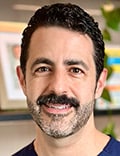The Optimized Doctor
 Jeffrey Benabio, MD, MBA is chief of dermatology at Kaiser Permanente San Diego. The opinions expressed in this column are his own and do not represent those of Kaiser Permanente. Dr. Benabio is @Dermdoc on X.
Jeffrey Benabio, MD, MBA is chief of dermatology at Kaiser Permanente San Diego. The opinions expressed in this column are his own and do not represent those of Kaiser Permanente. Dr. Benabio is @Dermdoc on X.- The Space to Listen
- Osler’s Advice and AI
- What We’ve Forgotten About Getting Well
- A Portrait of the Patient
- Doing the Best They Can
- Rise of the Scribes
- Healing Trauma
- Is It Time to Air Grievances?
- Life in the Woods
- Suits or Joggers? A Doctor's Dress Code
- The Differential Diagnosis You're Missing
- Can We Be Too Efficient?
- How to Become Wise
- Could ChatGPT Write This Column?
- The Loss of Letters
- Time for a Rest
- Sick Call
- The 'Root Cause' Visit
- Losing and Preserving Dignity
- Dig Like an Archaeologist
